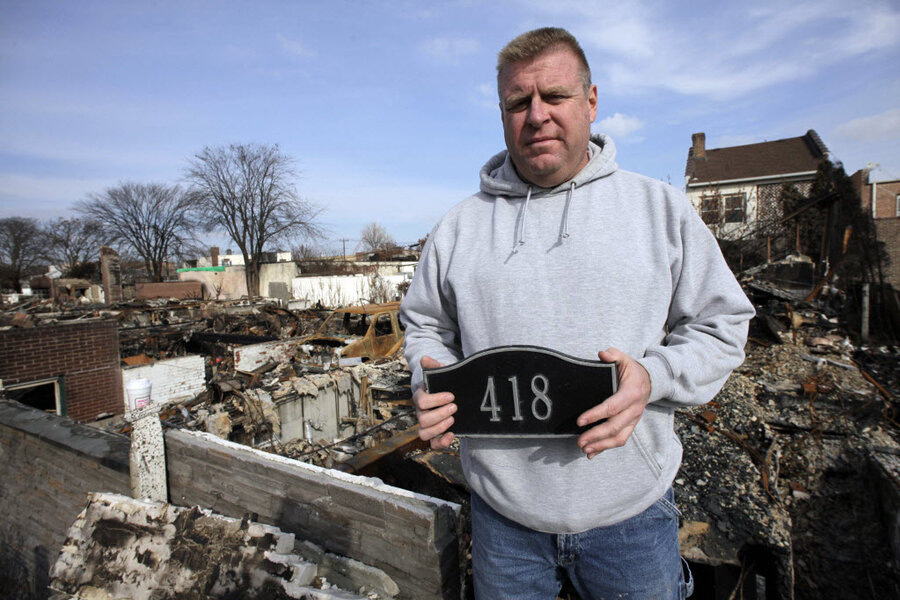Giving thanks after superstorm Sandy
Loading...
| New York
The things that Marge Gatti once cherished are lying on what's left of her deck, spattered in mud, like a yard sale gone awry.
The white fur coat she bought for $80 at an auction. Family videos. A peach-colored glass creamer from England. Books she never got a chance to read.
The stuff is ruined, just like her sodden Staten Island home, which was ravaged by Superstorm Sandy's floodwaters and will be demolished in the coming weeks. Of all things material, Gatti has nothing.
And yet, on Thanksgiving Day, she will be counting her blessings.
"My sons are alive. They were trapped here," said Gatti, 67, who lived in the beige home down the block from the Atlantic Ocean for 32 years. "I'm thankful that I have all my family. And that my friends are still here, you know? We're all friends now. There's no strangers in life anymore."
It will be a subdued Thanksgiving for families hit hard by the storm as they gather with friends and strangers alike, seeking to celebrate the people and things that were spared when so much was lost. But they will not be left to fend for themselves.
Restaurants are donating meals, strangers and churches are opening their doors, and people from across the nation have sent an outpouring of donations for those unable to roast their own turkey.
New York City and Macy's have set aside 5,000 bleacher seats along the Thanksgiving Day Parade route for families affected by Superstorm Sandy. Occupy Sandy, the storm-relief offshoot of the Occupy Wall Street movement, will host a Thanksgiving dinner in lower Manhattan.
Jennifer Kaufman of Washington Township, N.J., started a Facebook page called "A Place at the Table" that matches willing Thanksgiving hosts with families who have been displaced by Sandy.
"No one should eat alone on Thanksgiving," Kaufman said.
In the Belle Harbor section of the Rockaways, Ray Marten is thankful his two teenage children are alive. At the height of the storm, he saw flames from burning homes dancing over the floodwaters. The three of them narrowly escaped just before the blaze engulfed their house. A neighbor in a scuba suit materialized out of the darkness and towed Marten's 13-year-old daughter to safety on a surfboard.
A restaurant in New Jersey is donating a catered Thanksgiving dinner for his family and other displaced relatives at his mother's overcrowded Brooklyn home, where they are staying. His wife's sister lost her home in the post-storm fire that destroyed more than 100 houses in the city's Breezy Point section.
"We won't be sitting at a dining room table. We'll be eating off of paper plates," said his wife, Linda. "But at least we'll be together."
The kitchen stove is still caked in mud at the mildewed Staten Island home of Amin and Rachael Alhadad, who have been running a borrowed generator for a few hours every night to keep themselves and their four children warm. In the living room, a dark line marks where the water rose almost to the ceiling. Their furniture consists of a couple of donated wicker chairs and a bench draped with Red Cross blankets and towels.
The Alhadads say they have nowhere else to go, no family or friends to rely on. And they refuse to live in a shelter.
"They keep asking, 'Are we going to have turkey?'" said Rachael Alhadad, indicating her sons, ages 14 and 15, who were playing restlessly on their smartphones. "Nope. We can't."
For Marge Gatti, who has blisters on her lips brought on by anxiety, the kindness of strangers has been almost too much to handle. There was the Australian man who raised $35,000 and handed out gift packages on the street from a U-Haul truck. An elderly rich man pulled up in a black Mercedes and peeled off $100 bills for everybody on the block. Dozens of girls cleaned debris off her front lawn.
"The caring was really from here," she said, putting a hand over her heart.
Her younger son has invited the entire block over for Thanksgiving dinner at his house. But the Gatti family will not be completely reunited for the holiday. Her oldest son, Anthony, has been sleeping in a tent that he pitched among the ruins on the front lawn of the house where he grew up.
"I'm going to stay here and protect what we have left," he said, his eyes filling with tears. "Which isn't much. But it's still ours."
Associated Press writers Karen Matthews in New York and Katie Zezima in Newark, N.J., contributed to this report.







